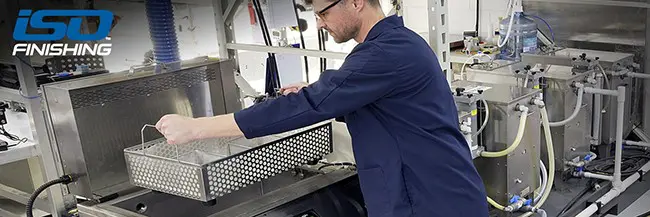Stainless steel is one of the most widely used metals in manufacturing. Passivation of stainless steel parts is needed for kitchen appliances to cutlery to parts for high-performance motorsports. While many industries rely on stainless steel for their products, it, like most metals, will eventually start to corrode over time. For that reason, stainless steel products undergo a process known as passivation.
Passivation is a process that creates a “passive” film, or oxide layer, on stainless steel to reduce the chemical reaction that causes corrosion. This is done by immersing the material in an acid bath, usually composed of nitric or citric acid. Once stainless steel has undergone this process, the result is a uniform, smooth appearance, longer lifespan, and resistance to corrosion.
After the passivation process is completed, the parts are put through two rinse cycles to remove the acidic compounds. The first is done using either tap water or deionized water, while the second rinse cycle requires deionized water. Once both rinse cycles have been completed, the parts can then be dried which is commonly done by placing them in a heated chamber or by using a centrifugal dryer. Finally, the parts can be tested to ensure they meet the specified standards. Typically, the testing process requires the parts to be exposed to either copper sulfate, salt spray, or high humidity.
Here are three common industries that use the process of passivation for their stainless steel products.
Medical
When it comes to medical equipment, it is vital components work with optimal precision. Medical devices and tools need to be clean, high-quality, and reliable. The medical industry relies heavily on the passivation of its stainless steel products for that reason. It is as equally important to ensure the surfaces are smooth to prevent bacteria growth. (Learn about isotropic superfinishing.)
Passivation in the production of surgical tools helps to keep them sharp as well as free from rust and other corrosion. When tools like surgical instruments, stents, tubing, dental products, and orthopedic devices are produced, laser marking is used. This process changes the composition of the metal and increases the likelihood of corrosion to occur. To counteract this change in composition, passivation is used.
In addition to surgical tools, passivation of stainless steel is also important to the pharmaceutical side of the medical industry. For example, an inhaler uses a stainless steel canister to dispense medicine to people with asthma. For the inhaler to work properly, the cannister undergoes passivation. This works to prevent corrosion and creates a smooth surface to prevent the drug from sticking inside the cannister.
Aerospace and Aviation
The aerospace and aviation industry includes general aviation, commercial aircraft, aerospace defense, and aircraft engines. When it comes to producing parts within the subsets of the aerospace and aviation industry, consistency is key. Each goes through rigorous quality control testing to verify they meet strict specifications. So, ensuring parts like turbine blades, instrument panels, and hydraulic components are free from contaminants is extremely important. Failure to remove corrosion-causing contaminants can cause parts to fail and result in disastrous situations.
Firearms
Over the years the has continued to evolve. Engineering advancements and technological improvements have resulted in high-precision manufactured firearm components. These advancements have not only increased the reliability and durability of firearms but have also improved their performance. To ensure these components meet the required specification and work properly, passivation is used.
Firearm components that often utilize passivation include barrels, firing pins, triggers, custom casings, and vented ribs. In addition to preventing corrosion of these parts, the process of passivation can increase their lifespan and help to reduce friction between moving parts.
Interested in learning more about the industries that require passivation for their products? Check out our industry guide or contact our team to discuss your finishing needs.


